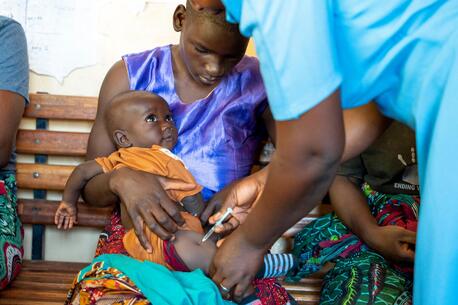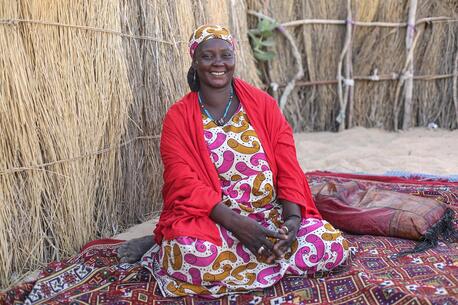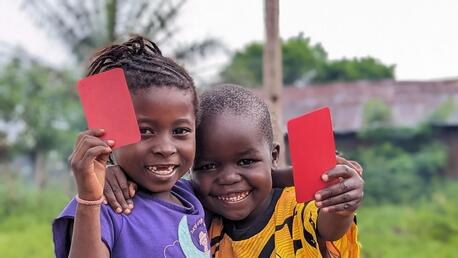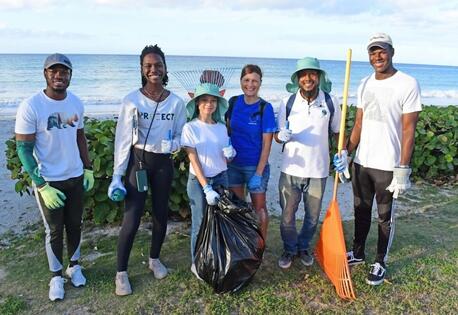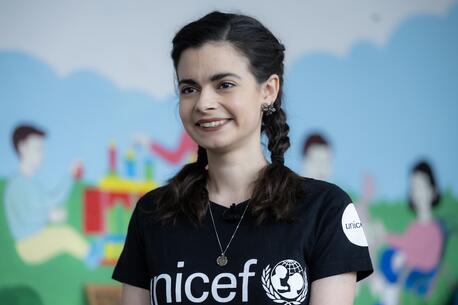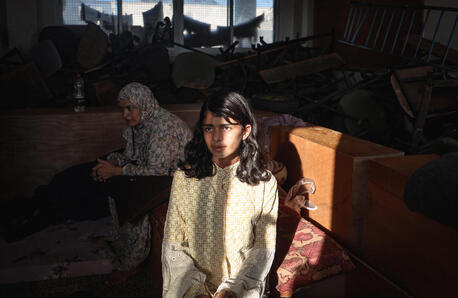
UNICEF's Role in Israel, Gaza and the West Bank
Frequently asked questions on UNICEF's humanitarian mandate to aid children suffering through unprecedented catastrophe.
On every side of violence, and in every way, it’s children who suffer most. UNICEF always puts children's needs first.
Jump to:
1. What are the universal humanitarian principles that guide UNICEF’s operations and advocacy?
2. How does UNICEF operate in Israel?
3. What is UNICEF’s humanitarian role during armed conflict?
4. Why does UNICEF refer to “parties to conflict” without calling them by name?
7. How does UNICEF operate in Gaza and the West Bank?
8. What is UNICEF’s humanitarian role within the wider United Nations system?
9. What is UNICEF calling for?
1. What are the universal humanitarian principles that guide UNICEF’s operations and advocacy?
As an operational humanitarian organization, UNICEF holds itself accountable to the principles of humanity, impartiality, neutrality and independence. UNICEF aims to uphold these universal principles in every context, by action and by word.
Humanity: Human suffering must be addressed wherever it is found. The purpose of humanitarian action is to save lives, protect health and ensure respect for human beings. UNICEF seeks to assist and protect every vulnerable child, treating each with dignity and respect.
Impartiality: UNICEF allocates and delivers assistance based on needs and without discrimination for nationality, ethnicity, race, age, sex, language, disability, religious belief, class, sexual orientation, gender identity, political opinions or other characteristics.
Neutrality: UNICEF refrains from engaging in controversies of a political, racial, religious or ideological nature, and does not take sides in hostilities.
Independence: Humanitarian action must be autonomous from the political, economic, military or other objectives that any actor may hold with regard to areas where humanitarian action is implemented. UNICEF is independent of political, economic, military, security or other objectives.
Humanitarian principles are critical to fulfilling UNICEF's United Nations mandate. They guide UNICEF’s programmatic and operational decisions while earning frontline workers the trust of the communities UNICEF seeks to serve. In dangerous environments — and especially during armed conflict — the security of humanitarian workers depends on the acceptance of those involved in fighting. UNICEF cannot reach children without this.
UNICEF's humanitarian policies and advocacy follow the same principles. UNICEF is mandated to promote and protect the rights of all children, guided primarily by the Convention on the Rights of the Child and its Optional Protocols, as well as international humanitarian law. Humanitarian advocacy includes promoting adherence to international and regional legal norms, standards and principles.
UNICEF’s commitment to humanitarian principles has kept it operational in complex situations since its founding. Today, UNICEF is on the ground in over 190 countries. Neutral and impartial, UNICEF is never indifferent when it comes to caring for children.
2. How does UNICEF operate in Israel?
In high-income countries such as Israel, Governments generally have adequate capacity to respond to emergencies. Upon request from the Government, UNICEF can extend support, such as mental health and psychosocial support for children.
In over 30 countries where UNICEF does not perform programmatic activities, National Committees for UNICEF serve as UNICEF's dedicated voice, helping to raise funds for UNICEF’s work worldwide, promoting children’s rights and lifting visibility for children threatened by poverty, disasters, armed conflict, abuse and exploitation. The Israeli Fund for UNICEF was established in 2009 to raise awareness of children’s rights in Israel and fundraise for UNICEF’s lifesaving work across the world.
3. What is UNICEF’s humanitarian role during armed conflict?
UNICEF’s humanitarian mandate is to help alleviate the suffering of children, no matter who they are or where they live.
In certain situations, when resources are readily available to meet children’s needs during an emergency, UNICEF does this by offering guidance and support to decision-makers on the ground. In others, UNICEF mobilizes staff and supplies, in collaboration with governments and partners, to provide direct assistance.
UNICEF aims to deliver critical aid to children caught in crisis, as outlined in international humanitarian and human rights law, including the 1989 Convention on the Rights of the Child. Ratified by nearly every country, the convention underpins UNICEF’s work in any context. In armed conflicts, it complements the universal principles that guide UNICEF's humanitarian operations and advocacy.
UNICEF has been operating impartially and neutrally since 1946. Then, UNICEF's mandate was to reach children on all sides of the war, regardless of the role their country played in fighting. Today, that mission remains the same. Impartial by procedure, UNICEF is never neutral when it comes to aiding children in need.
4. Why does UNICEF refer to “parties to conflict” without calling them by name?
UNICEF’s mandate in any conflict is to help protect children’s rights and alleviate their suffering. This means calling on those involved in fighting to abide by their obligations under international law, in the manner experience has shown to serve the best interests of children caught in hostilities. It also means working to reach those children with lifesaving aid, no matter who holds power where their families live.
As a humanitarian agency, UNICEF must ensure aid workers can access children on every side of violence while minimizing security concerns for on-the-ground operations. Protecting humanitarian access requires open lines of communication with all involved in fighting.
In complex and dangerous environments, public denunciation of any party to conflict can risk cutting UNICEF’s lines of communication with those parties. More urgently, it can threaten the safety and security of children and aid workers. As a matter of principle, UNICEF prioritizes the services its humanitarian staff provide to children, as well as the safety of those staff on the ground.
Any engagement with armed forces or armed groups — as needed to sustain humanitarian operations or press parties to comply with their responsibilities to protect children — is initiated in accordance with humanitarian guidelines for civil-military coordination.
In line with its Core Commitments for Children, UNICEF also collects reports of grave violations against children in conflict-affected countries. UNICEF does this in coordination with other UN agencies to advance advocacy efforts to end and prevent violations against children, and to inform emergency programming. UNICEF does not have the mandate to investigate violations of international law, nor to make legal determinations about those responsible for violations.
When UNICEF does speak out publicly, it does so in line with humanitarian principles. UNICEF's aim is to focus the world’s attention not on the causes of conflict, but on the consequences for children. The only side UNICEF takes in war is theirs.
5. Does UNICEF’s commitment to neutrality and other humanitarian principles prevent it from speaking up against violations of children’s rights?
No. UNICEF will continue to speak out against violations of children’s rights, including grave violations committed against children on every side of violence. UNICEF's mandate is to conduct humanitarian advocacy for sustained, unimpeded access to all children in need, and to do so in line with humanitarian principles. How and where UNICEF speaks out is determined by risk assessments that prioritize the ability of humanitarian workers and emergency supplies to reach children caught in conflict.
Children bear no responsibility for war. UNICEF persists in pressing world leaders on every occasion to abide by their obligations under international humanitarian and human rights law, which afford children special protections in any circumstance.
6. Has UNICEF spoken out on the violations committed against children in Israel, Gaza and the West Bank?
Yes. In public and behind closed doors, UNICEF has spoken out on the violations committed against children in Israel, Gaza and the West Bank unequivocally, consistently and since the earliest days.
Even wars have rules. The killing and maiming of children is a grave violation condemned by the United Nations Security Council. Attacks on schools and hospitals are grave violations. The abduction of children — as an intentional act of violence or retaliation, to instill fear among populations, to sexually abuse children, and in absolutely any other circumstance — is a grave violation. The denial of humanitarian access to children is a grave violation.
UNICEF condemns every violation committed against children throughout this crisis. Armed conflict inflicts the most severe and heinous harm on them. Deprived of fundamental human rights, children living through war are also exposed to unconscionable forms of violence, including sexual violence — a grave violation — unlawful arrest, and detention.
We appeal to world leaders, from the start of this catastrophe through today: Children on every side of fighting must be protected from further suffering. In any circumstance, at all times, they must not come under attack.
Public statements on violations against children in Gaza
From the earliest days of escalating hostilities in the Gaza Strip, UNICEF has unequivocally called for an immediate humanitarian ceasefire. Like many others, UNICEF has pleaded for the killing of children to stop. Like many others, UNICEF has pleaded for an end to the bombardment of schools, hospitals and other civilian infrastructure. Like many others, UNICEF has pleaded for the opening of all access crossings into the Gaza Strip, and for the safe, unimpeded movement of humanitarian workers and supplies across Gaza.
But today, the Gaza Strip is the most dangerous place in the world to be a child. And when fighting ends, it will likely remain that way — with the heaviest concentration of unexploded ordnance expected on the planet.
Public statements on violations against children in Israel
UNICEF calls for the immediate, safe and unconditional release of all Israeli and foreign hostages being held captive in Gaza — children, women and men. Hostage-taking is a war crime, prohibited by international humanitarian law in all circumstances. Every hostage must be released immediately and safely. Release must not be made conditional on any other demand.
UNICEF has publicly called for the release of hostages since Oct. 9 and will continue to do so through private advocacy and public statements. As of Dec. 4, UNICEF has issued over 100 statements on the abduction of Israeli children, including in interviews with the press and on social media. UNICEF has reiterated these demands at the Security Council, imploring the adoption of a resolution that includes the release of all abducted children.
UNICEF senior officials have also traveled to Gaza, the West Bank and Israel to meet with the families of victims and press for humanitarian action for child survivors of all violations.
For more information on UNICEF’s work to help protect children during humanitarian crises, read on.
7. How does UNICEF operate in Gaza and the West Bank?
UNICEF has been supporting Palestinian children in the West Bank and the Gaza Strip since the early 1980s. Following the establishment of the Palestinian Authority in 1994, UNICEF appointed its first Special Representative to serve Palestinian children.
With staff in Jerusalem and the Gaza Strip, UNICEF works to fulfill children’s rights and provide them with critical services and care. UNICEF teams help keep children connected to water and sanitation, education, health care and protection services while supporting social policy programs that shield children from the lifelong consequences of poverty and exclusion.
Learn more about UNICEF’s humanitarian response in Gaza here.
8. What is UNICEF’s humanitarian role within the wider United Nations system?
The United Nations was founded in the aftermath of World War II to bolster international peace and security and promote fundamental human rights. By mandate from the United Nations General Assembly, UNICEF works to protect the rights of children, in times of peace or crisis.
UNICEF's duty to protect underlies all others during armed conflict: UNICEF carries out emergency relief efforts, in coordination with United Nations partners and other humanitarian actors, to address children’s lifesaving needs and help alleviate suffering. While this action reinforces that of other UN bodies — including those fulfilling mandates in peace, security and the rule of law — its central purpose remains the delivery of protective care. UNICEF stands with the United Nations Secretary-General, and the entire UN family, in support of all efforts to end conflict and hold perpetrators to account.
On every side of violence, and in every way, it’s children who suffer first and foremost.
9. What is UNICEF calling for?
UNICEF appeals to world leaders to abide by their obligations under international humanitarian and human rights law to protect children suffering through this unprecedented catastrophe. Children need a humanitarian ceasefire now. See all UNICEF's calls for action here.
Learn more about UNICEF’s core commitments for children caught in conflict and other humanitarian crises.

